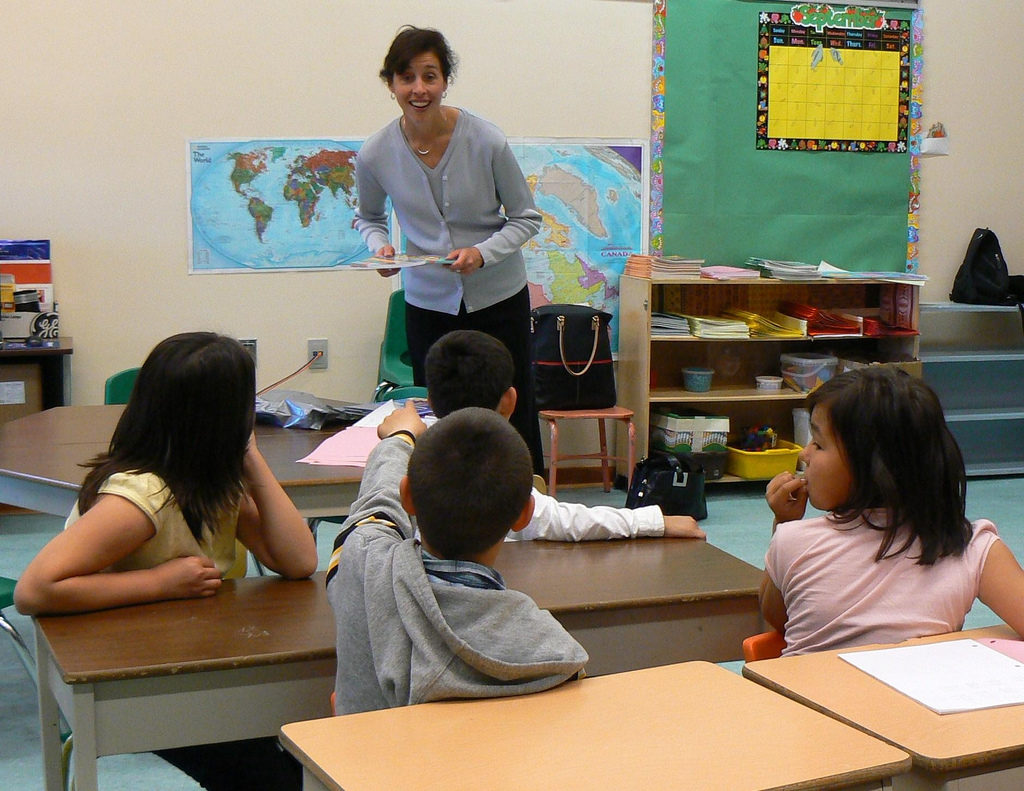A wide range of universal behaviour management interventions have been developed for use in schools, including for example the Good Behaviour Game (in which children are rewarded by the teacher for adhering to four basic rules of classroom conduct), and School-Wide Positive Behaviour Support (which involves a multi-tiered systems change process that helps schools to set and teach behavioural expectations and routines more effectively).
In broad terms, these approaches typically focus on pupils’ behaviour, teachers’ behaviour, teacher-pupil relationships, and/or pupils’ social and emotional development. A recent meta-analysis of more than 50 studies demonstrated that universal behaviour management interventions implemented in primary school settings produce small but meaningful improvements in pupils’ academic, behavioural, social-emotional, and motivational outcomes (Korpershoek, Harms, de Boer, van Kuijk & Doolard, 2016).
The focus of the STARS trial, published today in Psychological Medicine and summarised in this blog, is the Incredible Years Teacher Classroom Management (IY-TCM) programme. IY-TCM aims to improve teachers’ classroom management skills and their relationships with pupils and their parents, assist them to develop effective behaviour plans and encourage them to adopt and promote emotional regulation skills. Achievement of these aims is facilitated through teachers’ participation in six 1-day training sessions spread over a one-year period. The sessions are led by facilitating group leaders (who in this study were in turn supervised by the programme’s developers), and include work on goal-setting, reflective learning, video-modelling, role play, and self-regulation training. IY-TCM is a manualised intervention in which fidelity is emphasised (Ford et al, 2018).

The Incredible Years Teacher Classroom Management programme offers a potential means through which to improve children’s mental health.
Methods
This study used a cluster randomised controlled trial (RCT) design, in which schools were randomly allocated to undertake the IY-TCM programme or continue their usual practice over a 30-month period (with outcomes assessed at 9, 18 and 30 months). One class in each of 80 schools (40 TCM, 40 usual practice; 2,075 children in total) participated.
The trial’s primary outcome was mental health difficulties, assessed via the Total Difficulties score from the teacher-report version of the Strengths and Difficulties Questionnaire (SDQ). The authors also collected data on a range of secondary outcomes (e.g. children’s disruptive behaviour, service use), in addition to detailing the costs of IY-TCM compared to usual practice.
Results
The authors report a range of pre-specified analyses pertaining to main (intention to treat) and subgroup effects of IY-TCM, the influence of intervention compliance (using complier average causal effect (CACE) estimation to test whether the number of training sessions attended by teachers made a difference to outcomes), and cost-effectiveness (in which the costs of the intervention are assessed, relative to their impact on service use and outcomes).
In relation to the primary trial outcome:
- IY-TCM led to a small but statistically significant reduction in mental health difficulties at 9-month follow-up
- Interestingly, the CACE analysis indicated that this finding did not vary as a function of intervention compliance (that is, the results would have been the same even if all teachers had attended all IY-TCM sessions).
Secondary analyses demonstrated that IY-TCM:
- Produced amplified effects among children with elevated mental health difficulties at baseline
- Led to significant reductions in disruptive behaviour and inattention/overactivity across all three follow-up waves
- Improved children’s social behaviour (reduced peer relationship problems and improved pro-social behaviour) at 9-month follow-up
- Was cost-effective when compared to usual practice.

The Incredible Years Teacher Classroom Management programme improved children’s mental health, particularly among those who were struggling prior to its implementation.
Conclusions
The authors conclude that Incredible Years Teacher Classroom Management may be an effective and cost-effective intervention in the short term, particularly for children whose mental health is a cause for concern.
Strengths and limitations
This is a very well designed study. Key indicators of its robustness include the RCT design, use of a very large sample of schools and pupils (meaning that it was appropriately powered to detect the likely effects of the intervention), good balance on observables (e.g. school and pupil characteristics) at baseline, high levels of participant retention over the course of the study, and no evidence of threats to internal validity (e.g. the study was carefully designed to eliminate the possibility of diffusion/contamination). In addition, the use of a range of sensitivity analyses (for example, comparing findings using complete cases only with those produced using multiple imputation to account for missing data) is commendable. Overall, the findings of the study can be considered highly secure.
Despite the considerable strengths of this trial, there were also some limitations that need to be borne in mind when considering its implications:
- Despite excellent overall retention rates, there was marked attrition at follow-up for outcomes involving parent-rated measures
- For obvious reasons it was not possible to use a blinded design (in which intervention status is masked to raters). This increases the possibility of response bias, particularly in the case of the 9-month follow-up, where the teachers completing the outcome measures in the intervention schools were also directly participating in IY-TCM
- Despite the very promising findings of the study, it would have perhaps benefited from an analysis in which the mechanisms underpinning the impacts observed could be established (e.g. a mediation analysis incorporating data on observed changes in teachers’ behaviour management practices in the classroom).
Implications for practice
The findings of this trial, coupled with its robustness, mean that the Incredible Years Teacher Classroom Management programme should be given serious consideration by schools and teachers seeking to improve the mental health of their pupils.

The Incredible Years Teacher Classroom Management programme should be given serious consideration by schools and teachers seeking to improve the mental health of their pupils.
Conflicts of interest
As an academic interested in the role of schools in promoting mental health, Neil has conducted several RCTs of related interventions (e.g. the Good Behaviour Game; Humphrey et al, 2018). However, these have all been as an independent evaluator, and as such he has no conflict of interest in relation to any of IY-TCM’s ‘competitor’ interventions.
Links
Primary paper
Ford T, Hayes R, Byford S, Edwards V, Fletcher M, Logan S, . . . Ukoumunne O. (2018) The effectiveness and cost-effectiveness of the Incredible Years® Teacher Classroom Management programme in primary school children: results of the STARS cluster randomised controlled trial. Psychological Medicine, 1-15. doi: 10.1017/S0033291718001484
Other references
Humphrey, N., Hennessey, A., Ashworth, E., Frearson, K., Black, L. Petersen, K., Wo, L., Panayiotou, M., Lendrum, A., Wigelsworth, M., Birchinall, E., Squires, G. & Pampaka, M. (2018). Good Behaviour Game: Evaluation report and executive summary. London: Education Endowment Foundation.
Korpershoek, H., Harms, T., de Boer, H., van Kuijk, M., & Doolaard, S. (2016). A meta-analysis of the effects of classroom management strategies and classroom management programs on students’ academic, behavioral, emotional, and motivational outcomes. Review of Educational Research, 86, 1–38. [Abstract]
Photo credits
- Photo by rawpixel on Unsplash
- US Embassy Canada CC BY 2.0
- woodleywonderworks CC BY 2.0
- Photo by Aaron Burden on Unsplash

[…] Incredible Years Teacher Classroom Management: STARS trial suggests benefits for children’s mental… […]